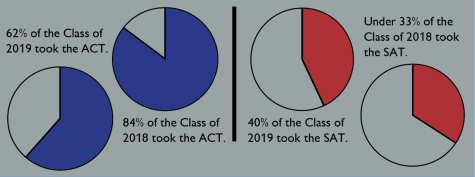Retake: New policy allows retesting of individual ACT sections
The American College Testing (ACT) organization announced this past month that it will allow students to retake individual sections on its college admissions test without having to redo the exam entirely.
The policy, officially referred to as “ACT Section Retesting” on its website, will go into effect starting Sept. 2020. The change, which could expedite and simplify the process of improving students’ test scores, has elicited mixed reactions from the CESJDS student body and the broader scholastic community.

As part of a broader new ACT initiative, the retesting policy also includes an automatic superscoring method that allows students to combine their best scores on individual test sections across several exams in order to receive their highest composite score for college submission. The ACT organization introduced a new online score reporting system to provide test-takers with faster results.
Dean of Academics Aileen Goldstein views the new policy as a step in the right direction towards leveling the playing field for all test-takers, including students with testing accommodations, but noted that she is uncertain how colleges and universities will respond with admissions decisions.
“I think our scores will go up for our students, absolutely, because if you are able to piece together your highest score, you’re going to score higher,” Goldstein said. “In the aggregate, if you’re looking at the entire country where that is happening, what does that do to the field of applicants and how do the colleges accept it?”
While Director of College Guidance Susan Rexford is concerned about the planning and consulting process that went into instituting the change, she feels that, overall, the policy is beneficial to students. Rexford remarked that JDS’ college counselors are not yet sure how the school will be impacted by the new policy, which they and other counselors around the nation were not given prior knowledge of.

“My guess is [the goal of the policy change was] to get more students to take the ACT because College Board [SAT organization] and ACT organization compete for students…. I do think that it is about grabbing attention and grabbing the market share, probably,” Rexford said.
Rexford also added that most JDS students opt to take the ACT exam because it aligns with the analytical and discussion-based curriculum of the school. Despite not knowing how the new policy will impact JDS students’ testing choices, she is sure that more students will take the ACT nationally.
According to Rexford, 62 percent of the graduating students in the Class of 2019 took the ACT exam, while just over 40 percent of them took the SAT. Even more drastic, 84 percent of the Class of 2018 took the ACT, while just under a third of the class took the SAT exam. These percentages do not add up evenly because some students took both.
Students in the junior and sophomore classes studying for exams and deciding which exams to take also have thoughts about how the policy change could affect their individual test-taking results.
Junior Sami Himmelfarb, who will be taking the ACT this year, had a mostly positive reaction to the new policy. Himmelfarb feels that it will help her target specific parts of the test that need “improvement.”
“I think the goal was likely to allow students the time and energy to focus their efforts on other aspects of the college process,” Himmelfarb said. “It is much more efficient to only retake and study for an individual section; however, it might not be the most beneficial option for everyone taking the test.”
Sophomore Eli Gordon, who has not yet determined which test he will take next year, says that the new ACT retesting policy will not impact his decision. Instead, the test where his scores are the highest will have greater weight over which exam he ultimately takes in his junior year.
“I don’t think this new policy will decide which test I take because I’m just going to take whichever test I perform higher on,” Gordon said. “Whatever categories I’m better at depending on the test is the one I would want to take, instead of just taking the ACT because I can take separate sections individually.”
This story was featured in the Volume 37, Issue 3 print edition of The Lion’s Tale, published on November 21, 2019.










